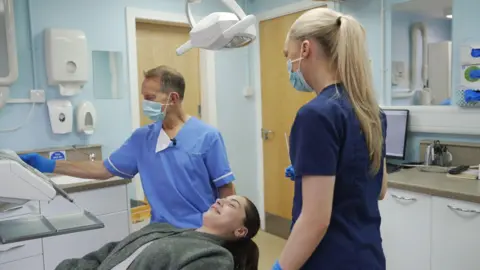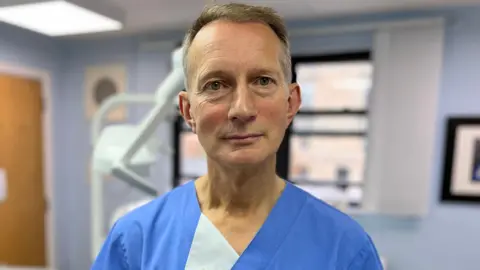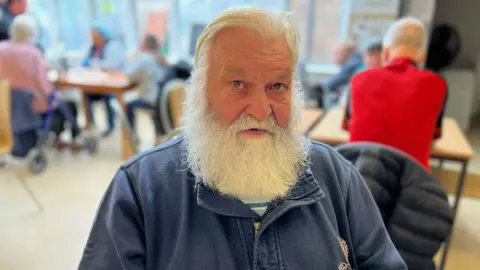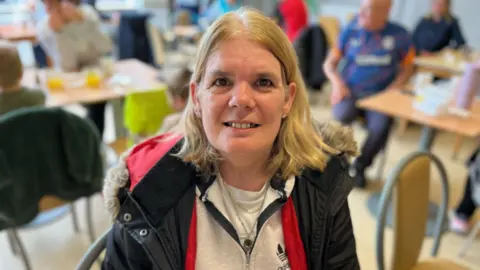Six Scottish areas are ‘dental deserts’

 BBC
BBC
Six Scottish council areas are “dental deserts” with no practices able to take on new adult NHS patients within three months, BBC News research has found.
Just one in every four dental practices in Scotland said they could offer NHS appointments to new patients within that timeframe.
The British Dental Association in Scotland said patient access issues are now a national problem and many dentists cannot afford to do NHS work.
The Scottish government said it recognised the challenges, particularly in rural areas, but that it continued to provide financial support to support NHS treatment.
In August, BBC Scotland News contacted almost 900 dental practices listed on the NHS Inform website to get a snapshot of the situation.
Of the 717 that responded, 185 offered NHS appointments to adults within three months. While only 26 practices offered appointments within two weeks.
At the time the research was carried out, Argyll & Bute, Dumfries & Galloway, Inverclyde, Orkney, Perth and Kinross and Shetland had no dentists with NHS capacity for new patients, while just one practice in Fife said it was registering NHS patients, with a waiting list of three months.
Three Scottish practices told BBC Scotland News they were registering new NHS patients but that there was a two-year waiting list for appointments.
And five practices said they had waiting lists of at least one year.
A total of 91 practices listed on the NHS Inform website said they were now fully private.
David McColl, chairman of the Scottish dental practice committee at the BDA, said patient access issues were now widespread with a “two-tier system” developing as many practices focus on private work.
He blamed treatment backlogs from the pandemic, recruitment problems and “inadequate government funding” with further reform needed to make the NHS “a more attractive place to work” for dentists.
Why is it so hard to get an NHS dentist?
Mr McColl, a dentist in Glasgow alongside his BDA role, said patient access issues were now a national problem.
He said: “We’ve always had a problem in Dumfries and Galloway in trying to recruit dentists and now we have places like Fife which are almost turning into a dental desert with practices closing.
“I think it’s a widespread problem now – we have Inverclyde is now a problem with practices closing to NHS patients. It’s always been a problem in the north of Scotland and Dumfries and Galloway but I think we’re seeing the problem spreading.”
Dentistry in Scotland has always been a mixed economy. As independent contractors, ‘high street’ dentists are paid per treatment for the NHS work they carry out, with patients also charged a fee.
Health boards also have a public dental service (PDA) for those who are not registered with a high street dentist.
But dentists are not obliged to carry out NHS work and many will have both private and NHS patients in the same practice, while some choose to be fully private.
In November last year, the Scottish government agreed a new funding model that saw an increase in the fees dentists receive. It also saw check-ups move from every six months to 12.
The changes have been welcomed by dentists, however the BDA warns there are significant recruitment challenges and without further reforms more dentists will move away from the NHS to private practice which is more attractive.


Mr McColl said there is now a two-tier system developing in dentistry.
He said: “As far as dentistry is concerned, patients now want things that the NHS cannot deliver – they want teeth whitening, six-month smiles, straight teeth, white crowns and white fillings – these are things the NHS do not provide.
“It’s up to the government to decide what the NHS is there for, and what the NHS can provide and have an open transparent discussion with the profession and patients about what the NHS can deliver.”


In Dumfries and Galloway, the health board appealed to the Scottish government for extra funds to address shortages.
That has resulted in one practice in Moffat taking on new NHS patients with all spaces now filled.
There have also been moves to bring 12 dental students for an outreach facility.
In Annan, residents described the lack of dental access as a “nightmare”.
William Anderson hasn’t been to a dentist “in years”.
The 76-year-old said: “I think there should be something put in place. What does it cost for an appointment now and how long is it going to take?”


Shirley Kirkpatrick was de-registered when her dentist moved private.
“My dentist has gone private and you have to pay upfront,” she said.
“I don’t have the money for that so I have to go to the dental hospital in Dumfries.
“I think it’s ridiculous. Annan is a small town but everyone needs a dentist.”
The Scottish Conservatives said that basic dental care was becoming “next to impossible” for many people.
Health spokesman Dr Sandesh Gulhane said: ““The critical shortage of NHS dentists has been exacerbated by the SNP making Scotland the highest taxed part of the UK, with the BDA pointing out it has actively hampered recruitment and retention of dentists.
“We risk becoming a nation with poor oral health, and our overwhelmed A&E departments will be left to pick up the pieces when desperate patients turn up in agony there. “
The BDA stated that Scotland needs “a 21st Century service in which dentists would choose to build a career.”
A Scottish government spokesperson said it recognised that in some areas, particularly rural ones, access to dental services remained “challenging”.
They said additional financial support had enabled the opening of the new surgery in Moffat, which was able to take on an extra 2,000 NHS patients.
They added: “Almost one year on from dental payment reform, NHS dental services are responding well to the changes with the latest figures showing over one million courses of treatment were delivered to patients in the quarter ending June 2024.”


It is your responsibility to register with an NHS dentist. If you are taken on then you are entitled to routine care. That should involve check ups, which may happen every two years, and things like fillings, crowns or teeth extractions.
You are expected to pay 80% of the cost of that treatment up to a maximum of £384.
There are exceptions to this and 40% of the Scottish population is entitled to free dental care. That includes anybody aged 25 and under, or pregnant women and nursing mothers as well as people on benefits.
Things like white fillings or veneers are not available on the NHS. Implants are only offered when there is a clinical need, for example as part of cancer treatment.
And often for more complex care, a local dentist in the community may refer you to a specialist in the NHS for further treatment.










